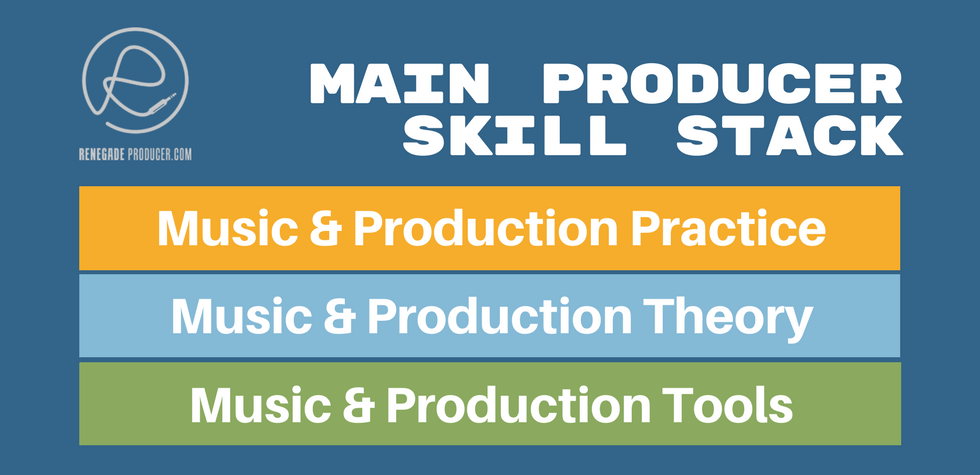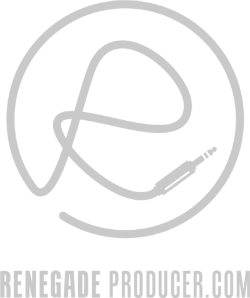25-step music production process checklist and video workshop >>>
12 Essential Music Production Skills That Will Make You a Proficient Producer Who Crushes It
Mmmmm macarons. Gotta love them. This post is however about your sweet, sweet, music production skills!
Top music producers and beatmakers stack a wide variety of skills which spread across the fields of music writing/composition, programming, tracking/recording, editing and mixing. I call the combination of these skills the Music Producer Skill Stack...

You probably already know you need to stack a variety of music production skills just to become a competent music producer. To become a proficient producer you need something more ...
... and that something is the ability to learn new music production skills and also unlearn some, on a continuous basis.
So, after you build your stack of fundamental producer skills you want to continue to refine and improve it.
There are only 2 real main ways you can improve your music producer skill-stack:
- Quantity: Add new skills to your stack.
- Quality: Improve your current skills.
When you start out producing it makes sense to focus more on number 1 above because you have a lot of skills to develop.
Once you have the fundamental skills needed to be a competent producer you want to continue to add new skills to your stack but also start to improve the skills you already have. The quality of your music production skills becomes just as important as the quantity of skills you have.
Let's take a look at the fundamental music production skills you want to stack and improve:

The Music Producer's Skill-Stack
1. Music & Production Tools
2. Music & Production Theory
- Basic music theory: Time signatures, beats & bars, notes, scales, intervals, chords, chord progressions.
- Basic arrangement theory: Song structures, sections, lyrics and melody.
- Basic
production theory: Audio, MIDI, synth programming, equalization, reverb, compression,
gating, delay, phasing, distortion, editing, programming, mixing.
3. Music & Production Practice
- The production process: Conception / Writing / Composing / Recording / Arranging / Editing / Mixing and Mastering.
- Music production exercises: Listening to music, ear training, song and mix analysis.
Now, let's delve a bit deeper for each area of skills...

1. Music & Production Tools
It starts in your home music studio. Your music production software and your music production hardware all comes with an inbuilt set of skills to master. These music production skills form an essential part of your overall producer skill-stack, as you can imagine.
Music studio software: Digital audio workstations and plug-ins.
The Digital Audio Workstation, or DAW, sits front and center in most home studios, so you must, I repeat, must, master your DAW. Read this post on how to become a DAW ninja if you don't know your DAW inside-out yet.
The same goes for the plugins you use. You want to get to know your plugins and what you can do with them. This is why it's a good idea to restrict the amount of plugins you have so you can focus on maxing out your music production skills with the ones you do use.
Use one or two good synths, one or two compression plugins, one or two reverb and delays. You get my drift. Keep your options few so you can go deep with each option and master your skills on that plugin. Then, try new plugins!
Music studio equipment: Monitors, outboard gear, microphones,
pre-amps and DI boxes, audio-interfaces and MIDI controllers.
Next, there's your hardware and outboard gear. Take time to read the manuals, test out functions and play with your equipment for no other reason than to get to know each piece of gear better and see which sonic monstrosities or delights you can summon with your current kit, before you buy new studio equipment.
Musical instruments: Guitar, keyboard or drums. *Optional but recommended*
To play a musical instrument is of course an optional music production skill, BUT
(yes, that's a big fat but!) it's a huge advantage when it comes to
songwriting and composing as it gives you a different place to start
tracks from. So add some keyboard or guitar skills to your stack. It will make you much more proficient as a producer, faster.

2. Music & Production Theory
Basic music theory: Time signatures, beats & bars, notes, scales, intervals, chords, chord progressions.
A basic music theory vocab is all you really need to get started. That bit of music producer know-how is essential. It will help you go from competent to proficient as a music producer, faster.
Do you need advanced music theory to produce most styles of music? Hell no! It cannot however hurt to know as much music theory as possible though. So, keep stacking the music theory skills while you continue to develop as a producer. I've written about the basic music vocab producers need here.
Basic arrangement theory: Song structures, sections, lyrics and melody.
Musical arrangement is another one of the most important music production skills you need to add to your stack. The easiest and best way to do this is to study and analyze commercial releases that already work. It's also helpful to learn about different types of popular song structures and figure out why they work.
Basic production theory: Audio, MIDI, synth programming, equalization, reverb, compression, gating, delay, phasing, distortion, editing, programming, mixing.
In terms of digital music production theory you want to make sure you have the basics of acoustics, analog and digital audio and digital audio processing down. You must have digital audio skills like audio editing and processing in your stack. The same goes for MIDI skills.
You want to delve into synth programming if you plan to produce decent level of electronic music. Yes, one can use and abuse presets. To really use synths for fun and profit you want to work on your own ability to program your own instrument patches. Check out Syntorial because it's the best way to learn synth programming and sound design from the ground up.
Equalization
is of course a skill you cannot leave out of your stack. It's a bread
and butter skill right up there in terms of importance along with
compression. These two skills will take a while to master as you can imagine, but master them you must!
Then there's FX skills like using reverb, delay, phasing, distortion and other processing. All essential music producer requirements if you want interesting, dynamic, polished and exciting mixes.

3. Music & Production Practice
The production process: Conception / Writing / Composing / Recording / Arranging / Editing / Mixing and Mastering.
The way you do this is by doing it. The more you produce the better. Once you're competent you want to produce, produce, produce and produce some more. Did I mention you need to produce? The more you work through the entire production process, the better you get at the entire music production process. Yes, that includes finishing and shipping your tracks, in case you're wondering!
At this stage workflow and creativity is important so I suggest you check out the Studio Flow course to make sure you produce as many tracks as possible on a consistent basis.
Music production exercises: Listening to music, ear training, song and mix analysis.
The
ability to listen is not only one of the most important music
production skills in your stack, it's something you can improve with
training. Read this post about ear training if this is a skill you need to add or improve.
That should give you a basic idea of the music producer skills and know-how you need. Each skill consists of smaller "sub-skills" as you can imagine. I will outline these skills and delve in deeper on each in a new series called Renegade Producer Skill Stacks. I will post new producer skill stacks below for you as they're available, so check back often or sign up for the Renegade Report below to stay updated:
Music Production Skills for Your Producer Skill Stack:
Share this post. Spread the knowledge so other producers can benefit too:
- Renegade Producer
- Producer Skills
ⓘ Some pages contain affiliate links so I might earn a commission when you buy through my links. Thanks for your support! Learn more

